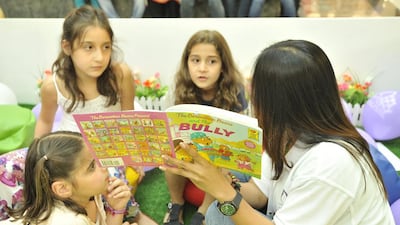Bullies, who likes them? Everyone, apparently. We admire people who scoff, tease, hit and jeer at others just to show how powerful they are. Look at the movie The Avengers, where so-called superheroes and a mythic god take merciless jabs at each other. Children love it, but what kind of message is it sending?
There are similar messages in cartoons, video games, websites and other media. It's a Molotov cocktail of angst, fear and hurt. But bullying is a learnt behaviour and, with a little work, it can be undone. “There are three kinds of people in this world – the bullies, the bullied and those who watch, but don’t stop it,” says psychologist Philip Zimbardo, who created the infamous Stanford Experiment, where subjects in a lab were assigned the roles of guards or inmates in a simulation of prison life. The result was an epic tale of bullying in which the guards used their power to humiliate and harm the prisoners. It became so bad it had to be abandoned.
But what happens when, instead of having power over each other, individuals feel the need to help and take care of each other?
A Turkish friend of mine wore really big, thick glasses as a child, yet he says that he was never bullied because of this. I call this the “kardash effect”, from the Turkish word for sibling. Through this lens, other people are seen as an extension of oneself. It is a powerful concept and it prevents children – and adults – from being hurt.
Brotherhood and sisterhood is what stitches individuals into the fabric of society. When I worked at Turkish schools, I was amazed how the children never fought with each other – unlike in the United States, where they fought all day, every day. In Turkey, to fight was regarded as shameful; in America it was almost a type of entertainment. Some children would actually feel bored if there wasn’t any trouble going on.
This concept has become a staple of reality television shows, where one person throws another “under the bus” or yells in someone’s face.
Bullying – from the boss to the street cleaner to the child at school – also occurs in the UAE. It seems to me that everyone has had a taste of it.
Two years ago, a child suffered brain damage after being bullied at school. In another case, an engineer in Dubai was bullied so badly at work that he quit his job. “Most people do it because they know that they will not get caught, or that no one has the guts to fight back,” the man told me. “The victims, mostly, are afraid that they will lose their jobs and get deported for causing trouble.”
Imagine a father who gets bullied at work, then comes home and bullies his wife and children. This turns into an angry ball of confusion spreading throughout society. It becomes a case of Zimbardo’s three: the bullied, the bully and those who do nothing to stop it.
Schools are mirrors of society, where administrators and parents may bully each other and both may gang up on the teachers. The pupils see this and then learn the power of bullying. The question is: what can individuals do to stop the cycle? Learn adab and akhlaq.
Adab is the knowledge that saves one from doing wrong. Akhlaq involves right actions and right behaviour. Together, they ensure the safety and comfort of everyone. These concepts are the foundation of Islam, and hold universal value for any society that wants to improve itself. The book Good Character, by Musa Kazim Gulcur, is a guide to these concepts and how to implement them at every level. The book serves well as a parenting book and as a business leadership manual.
In the 1990s, New York City adopted a “Nice New Yorker” campaign in an attempt to change the image of its citizens. Perhaps we could start an akhlaq campaign, were people can learn adab and akhlaq. It can start at school and, insha Allah, grow from there.
Maryam Ismail is a sociologist and teacher who divides her time between the US and the UAE

